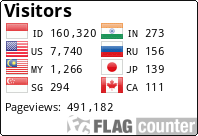Pengembangan Modul Materi Sistem Persamaan Linear Dua Variabel Konteks Budaya Banjar
DOI:
https://doi.org/10.33369/jpmr.v6i3.15703Keywords:
modul, sistem persamaan linear dua variabel, budaya BanjarAbstract
Salah satu ilmu pengetahuan yang memiliki manfaat dalam mengatasi masalah sehari-hari adalah matematika. Namun, banyak siswa yang merasa kurang senang dalam belajar matematika, salah satunya dikarenakan bahan ajar yang kurang menarik sehingga diperlukan bahan ajar yang menarik, salah satunya adalah modul yang konteksnya terkait dengan kegiatan sehari-hari masyarakat suku Banjar. Tujuan penelitian ini adalah mengembangkan sebuah modul sistem persamaan linear dua variabel berbasis konteks budaya Banjar yang layak. Metode penelitian yang digunakan adalah metode penelitian dan pengembangan dengan model Plomp. Uji coba dilakukan pada enam siswa kelas VIII SMPN di Banjarmasin yang mewakili kemampuan matematika rendah, sedang dan tinggi. Berdasarkan empat fase model Plomp, diperoleh modul sistem persamaan linear dua variabel konteks budaya Banjar yang valid dan efektif.
References
Alhadi, S., & Nanda Eka Saputra, W. (2017). The Relationship between Learning Motivation and Learning Outcome of Junior High School Students in Yogyakarta. 66(Yicemap), 138–141. https://doi.org/10.2991/yicemap-17.2017.23
Ekawati, A., Astnan, M. F., & Hayati, M. (2019). Geometrical concepts on Batik Sasirangan. Journal of Physics: Conference Series, 1200(1). https://doi.org/10.1088/1742-6596/1200/1/012001
Ellizar, E., Hardeli, H., Beltris, S., & Suharni, R. (2018). Development of Scientific Approach Based on Discovery Learning Module. IOP Conference Series: Materials Science and Engineering, 335(1), 1–7. https://doi.org/10.1088/1757-899X/335/1/012101
Fairuz, F. R., Fajriah, N., & Danaryanti, A. (2020). Pengembangan LKPD Materi Pola Bilangan Berbasis Etnomatematika Sasirangan Di Kelas VIII Sekolah Menengah Pertama. EDU-MAT: Jurnal Pendidikan Matematika, 8(1), 29–38. https://doi.org/10.20527/edumat.v8i1.8343
Fajriah, N., & Suryaningsih, Y. (2021). Ethnomathematics of the Jami Mosque Jingah River as a source mathematics learning. Journal of Physics: Conference Series, 1760, 1–7. https://doi.org/10.1088/1742-6596/1760/1/012025
Hardiarti, S. (2017). Etnomatematika : Aplikasi Bangun Datar. Aksioma, 8(2), 99–110. https://doi.org/10.26877/aks.v8i2.1707
Hervanda, Y., Fajriah, N., Suryaningsih, Y., & Matematika, P. (2020). Soal Model Pisa Dengan Konteks Etnomatematika Untuk Mengukur Kemampuan Pemecahan Masalah Siswa (Problems Of Pisa Type With Ethnomatematic Context To Measure Student Problem Solving Ability ). 2(2), 76–82.
Himmi, N., & Hatwin, L. B. A. (2018). Pengembangan Modul Sistem Pertidaksamaan Dua Variabel Berbasis Geogebra Terhadap Kemampuan Visual Thinking Matematis Siswa Kelas X. PYTHAGORAS: Jurnal Program Studi Pendidikan Matematika, 7(1), 35–46. https://doi.org/10.33373/pythagoras.v7i1.1208
Jazim, Anwar, R. B., & Rahmawati, D. (2017). The use of mathematical module based on constructivism approach as media to implant the concept of algebra operation. International Electronic Journal of Mathematics Education, 12(3), 579–583.
Kariman, D., Harisman, Y., Sovia, A., & Prahmana, R. C. I. (2019). Effectiveness of guided discovery-based module: A case study in Padang city, Indonesia. Journal on Mathematics Education, 10(2), 239–250. https://doi.org/10.22342/jme.10.2.6610.239-250
Khabibah, E. N., Masykuri, M., & Maridi, M. (2017). The Effectiveness of Module Based on Discovery Learning to Increase Generic Science Skills. Journal of Education and Learning (EduLearn), 11(2), 146–153. https://doi.org/10.11591/edulearn.v11i2.6076
Kintoko, & Jana, P. (2019). Development of Mathematics Module on the Material of Flat Side Space Building in DIY Culture-Based. Journal of Physics: Conference Series, 1254(1), 1–7. https://doi.org/10.1088/1742-6596/1254/1/012072
Leasa, M., Talakua, M., & Batlolona, J. R. (2016). The development of a thematic module based on Numbered Heads Together (NHT) cooperative learning model for elementary students in Ambon, Moluccas-Indonesia. New Educational Review, 46(4), 174–185. https://doi.org/10.15804/tner.2016.46.4.15
Martiningsih, I., Mulyani, S., & Susilowati, E. (2018). Development of Module Based on Scientific Contextual Additives Material to Increase Learning Outcomes and Science Process Skills in Junior High School. Journal of Innovative Science Education, 7(2), 372–381.
Maryam, M., Masykur, R., & Andriani, S. (2019). Pengembangan e-modul matematika berbasis Open Ended pada materi sistem persamaan linear dua variabel kelas VIII. AKSIOMA : Jurnal Matematika Dan Pendidikan Matematika, 10(1), 1. https://doi.org/10.26877/aks.v10i1.3059
Novintya, H. T., & Education, M. (2018). Mathematics-Based Development Module Problem-Based Learning Model to Improve Critical Thinking Ability. International Summit on Science Technology and Humanity (ISETH), 193–200.
Plomp, T. (2013). Educational Design Research an Introduction, in Tjeerd Plomp and Nienke Nieveen. SLO. Enschede.
Prastowo, A. (2012). Panduan Kreatif Membuat Bahan Ajar Inovatif. DIVA Press. Yogyakarta.
Rahman, M. H. A., & Puteh, M. (2016). Learning trigonometry using geogebra learning module: Are under achieve pupils motivated? AIP Conference Proceedings, 1750(June), 040001-1-040001–040005. https://doi.org/10.1063/1.4954586
Rahmawati, R., Lestari, F., & Umam, R. (2019). Analysis of the Effectiveness of Learning in the Use of Learning Modules Against Student Learning Outcomes. Desimal: Jurnal Matematika, 2(3), 233–240. https://doi.org/10.24042/djm.v2i3.4557
Saefudin, A. A., Aviori, K., & Ayuningtyas, K. (2019). Development of Mathematics Module Based on M-APOS Learning Model to Improve Students’ Mathematical Problem Solving Ability. Journal of Physics: Conference Series, 1254(1), 1–6. https://doi.org/10.1088/1742-6596/1254/1/012083
Setiawan, B., Innatesari, D. K., Sabtiawan, W. B., & Sudarmin, S. (2017). The development of local wisdom-based natural science module to improve science literation of students. Jurnal Pendidikan IPA Indonesia, 6(1), 49–54. https://doi.org/10.15294/jpii.v6i1.9595
Sihotang, A., Subianto, M., & Abidin, Z. (2019). Development of Straight Line Equation Modules To Improve Students’ Mathematical Connection Ability Through Middle School Inquiry Learning. Eduma : Mathematics Education Learning and Teaching, 8(1), 1–10. https://doi.org/10.24235/eduma.v8i1.3800
Suastika, I. K., & Tri Wahyuningtyas, D. (2018). Developing Module of Fractional Numbers using Contextual Teaching and Learning Approach. Pancaran Pendidikan, 7(1), 23–32. https://doi.org/10.25037/pancaran.v7i1.132
Telaumbanua, Y. N., Sinaga, B., Muhtar, & Surya, E. (2017). Improving High-Level Thinking Skills by Development of Learning PBL Approach on the Learning Mathematics for Senior High School Students. International Education Studies, 10(8), 73–80. https://doi.org/10.5539/ies.v10n8p12
Wardani, S., Nurhayati, S., & Safitri, A. (2016). The Effectiveness of the Guided Inquiry Learning Module towards Students. International Journal of Science and Research (IJSR), 5(6), 1589–1594. https://doi.org/10.21275/v5i6.nov164512
Widiyawati, A. (2018). The Improvement of Mathematics Achievement by The Use of an Integral Task Module. Journal of Islamic Culture and Education, 3(2), 226–250. https://doi.org/10.18326/attarbiyah.v3i2.226-250
Yerimadesi, Bayharti, Jannah, S. M., Lufri, Festiyed, & Kiram, Y. (2018). Validity and Practitality of Acid-Base Module Based on Guided Discovery Learning for Senior High School. IOP Conference Series: Materials Science and Engineering, 335(1), 1–11. https://doi.org/10.1088/1757-899X/335/1/012097
Yusmin, E. (2016). Matematika ( Rangkuman Dengan Pendekatan Meta-. Jurnal Visi Ilmu Pendidikan, 2119–2136.
Downloads
Published
How to Cite
Issue
Section
License

Jurnal Pendidikan Matematika Raflesia oleh https://ejournal.unib.ac.id/index.php/jpmr dilisensikan di bawah Lisensi Internasional Creative Commons Attribution-ShareAlike 4.0 International .







